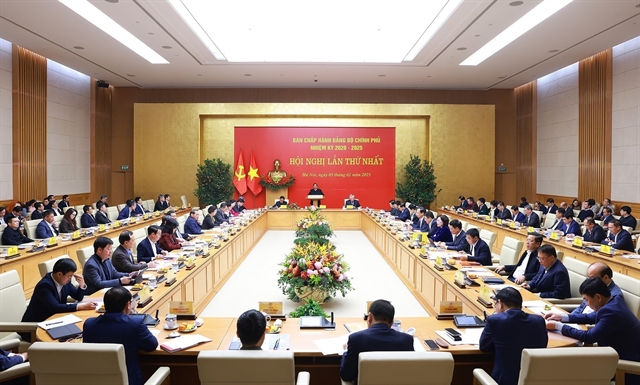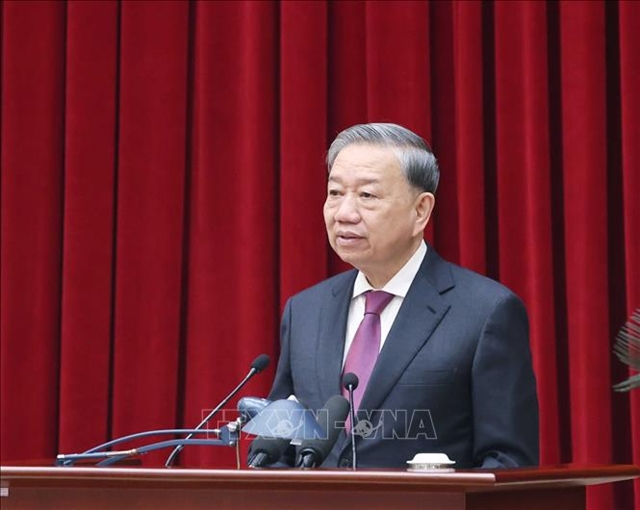 Politics & Law
Politics & Law

 |
| General Secretary Tô Lâm. VNA/VNS Photo |
HÀ NỘI – The Party Congresses at all levels for the 2025-2030 term hold immense significance, serving not only as a major political event that deeply engages the entire Party and the people, but also as a crucial foundation for the successful organisation of the 14th National Party Congress.
General Secretary Tô Lâm has written an article underscoring the importance of these congresses and their role in shaping the Party’s leadership and guiding national development in the years ahead.
In his article, the Party leader reaffirmed the pivotal role and core responsibilities of the Party Congresses, emphasising that they serve as strategic, guiding and foundational mechanisms within both the Party and society.
The congresses for this term will focus on three essential tasks: reviewing and approving key Congress documents at their respective levels while contributing feedback to higher-level Congress documents, including those of the 14th National Party Congress; electing leadership personnel for Party committees across all levels; and finalising leadership structures from the grassroots level to the Party’s Central Committee.
These tasks are of critical importance, directly impacting the Party’s leadership effectiveness, governance capacity, and internal strength, as well as shaping the nation’s long-term development strategy. The outcomes of these congresses will not only determine the effectiveness of Party leadership in the 2025-2030 term but will also influence the nation’s future stability, strength and prosperity, according to the Party leader.
To ensure the successful organisation of the Party Congresses for the 2025-2030 term, General Secretary Tô Lâm outlined three key priorities that must be addressed at all levels.
First, it is essential to unify perspectives on Việt Nam’s achievements under the Party’s leadership over the past 95 years, particularly in the 40 years since the Đổi mới (Renewal) reforms. These milestones are a source of national pride, yet significant challenges remain.
The upcoming Party Congresses must take responsibility for addressing these challenges. Institutional bottlenecks, longstanding policy barriers and the risk of economic stagnation—particularly in growth, technological advancement, and the middle-income trap—continue to pose serious concerns. Meanwhile, natural disasters, climate change and environmental degradation have had severe impacts on many regions. Issues such as corruption, wastefulness and bureaucratic inefficiencies also require decisive solutions.
Moreover, inconsistencies between words and actions, lack of accountability, and bureaucratic inertia create vulnerabilities that hostile forces can exploit to undermine national stability. These threats directly endanger Việt Nam’s long-term development strategy, particularly its goal of becoming a high-income, developed nation by the mid-21st century. To navigate these challenges, the Party must accurately assess both risks and opportunities, set clear objectives, and implement bold, decisive actions to remove obstacles, unlock resources and maximise national potential.
Second, Congress documents at all levels—including those for the 14th National Party Congress—must be drafted rigorously, with evidence-based analysis and a focus on key priorities. Political reports must offer an objective evaluation of previous resolutions, reflecting real-world conditions and acknowledging both achievements and shortcomings.
These reports must pinpoint institutional weaknesses and identify their root causes, ensuring that proposed solutions are practical and actionable. The drafting process must incorporate local insights, innovative models and global best practices, while anticipating emerging trends and national development needs.
Third, the selection of leadership personnel must be thorough, strategic, and forward-looking. This process is not just about determining leadership for a single term—it is about shaping the Party’s long-term future, national governance, and overall stability.
Achieving the right balance between continuity and renewal is crucial. The Party must select highly competent, committed leaders while firmly eliminating political opportunism and factionalism. Merit-based selection should be the guiding principle, ensuring that candidates demonstrate political integrity, strategic vision, reform-minded thinking, and a strong sense of accountability.
The selection process must be transparent and scientifically rigorous, preventing manipulation, bias, or the influence of vested interests. The goal is to identify and elevate the most capable leaders, while decisively rooting out corruption, self-interest, and power struggles that could hinder progress.
As the Party prepares for the 2025-2030 term, it must uphold the core principles of democratic centralism, unity, and self-criticism. The Party Congresses must be substantive and efficient, avoiding wastefulness and excessive formalities, while ensuring that resolutions are effectively implemented to serve the people.
A strong communication strategy will be essential in strengthening public trust, fostering unity, and encouraging active participation in shaping Party policies. Promoting open, inclusive discussions, encouraging constructive debate and maintaining vigilance against external interference and misinformation will also be critical.
By harnessing collective wisdom, reinforcing national solidarity, and selecting the right leaders, the Party Congresses for the 2025-2030 term will play a decisive role in Việt Nam’s continued development, stability, and global standing. Their success will pave the way for strong governance, national progress and international recognition, the article says. VNS




